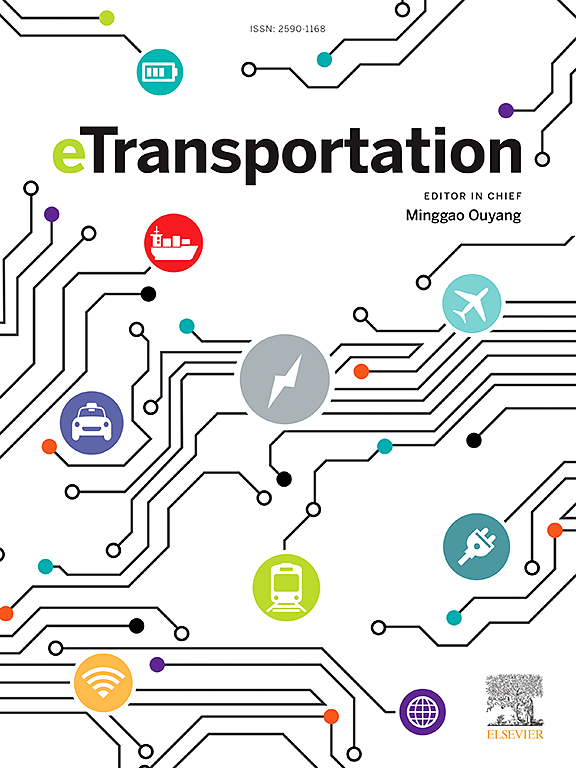采用基于模型的快速充电策略进行整体热管理和充电停止优化
IF 17
1区 工程技术
Q1 ENERGY & FUELS
引用次数: 0
摘要
交通运输部门日益增长的脱碳需求可以通过大规模电气化来解决,目前电气化受到对里程焦虑和充电速度不足的担忧的阻碍。因此,无论在何种路线或环境条件下,提供确保快速充电能力的方法至关重要。基于模型的快速充电和预处理策略已被证明是一种可靠的方法,可以在不危及电池安全或寿命的情况下实现短充电时间。然而,在考虑路线基础设施和能源限制等因素的同时,它们必须根据车辆应用进行扩展。在这项研究中,我们利用动态规划方法来优化长途旅行的充电停止和预处理策略。通过使用特斯拉Model 3标准续航里程850公里的长途行驶实验,验证了该方法的有效性,结果表明,与车载路线规划算法相比,充电时间可缩短24分钟,同时消耗的热管理能量更少。一项模拟研究表明,在几乎不需要主动预处理的情况下,利用阳极电位控制充电协议来防止镀锂的假设高功率电池,可以利用固有的自热行为,与参考相比,充电时间减少50分钟。此外,优化充电站之间的车速还可以根据充电限制和个人对时间和能源成本价值的偏好来调整总行程时间和能源消耗。本文章由计算机程序翻译,如有差异,请以英文原文为准。
Holistic thermal management and charge stop optimization using model-based fast-charging strategies
The growing need to decarbonize the transport sector can be addressed through wide-scale electrification, which is currently hampered by concerns regarding range anxiety and insufficient charging speeds. Therefore, it is critical to provide methodologies that ensure fast-charging capability regardless of route or ambient conditions. Model-based fast-charging and preconditioning strategies have been shown to offer a robust approach to achieve short charging times without endangering battery safety or longevity. However, they must be scaled to the vehicle application while considering factors such as route infrastructure and energy constraints. In this study, we utilize a dynamic programming approach to optimize a charge stop and preconditioning strategy for long-distance journeys. The methodology is validated by performing long-distance travel experiments on a route of 850 km using a Tesla Model 3 Standard Range, revealing that charging time can be reduced by 24 min while simultaneously consuming less thermal management energy compared to the onboard route planning algorithm. A simulation study with a hypothetical high-power cell using an anode potential control charging protocol to prevent lithium plating shows that the inherent self-heating behavior could be leveraged to achieve a charge time reduction of 50 min compared to the reference, while requiring almost no active preconditioning. Optimizing the vehicle speed between charging stations additionally allows total travel duration and energy consumption to be adjusted based on charging constraints and individual preferences regarding the value of time and energy costs.
求助全文
通过发布文献求助,成功后即可免费获取论文全文。
去求助
来源期刊

Etransportation
Engineering-Automotive Engineering
CiteScore
19.80
自引率
12.60%
发文量
57
审稿时长
39 days
期刊介绍:
eTransportation is a scholarly journal that aims to advance knowledge in the field of electric transportation. It focuses on all modes of transportation that utilize electricity as their primary source of energy, including electric vehicles, trains, ships, and aircraft. The journal covers all stages of research, development, and testing of new technologies, systems, and devices related to electrical transportation.
The journal welcomes the use of simulation and analysis tools at the system, transport, or device level. Its primary emphasis is on the study of the electrical and electronic aspects of transportation systems. However, it also considers research on mechanical parts or subsystems of vehicles if there is a clear interaction with electrical or electronic equipment.
Please note that this journal excludes other aspects such as sociological, political, regulatory, or environmental factors from its scope.
 求助内容:
求助内容: 应助结果提醒方式:
应助结果提醒方式:


